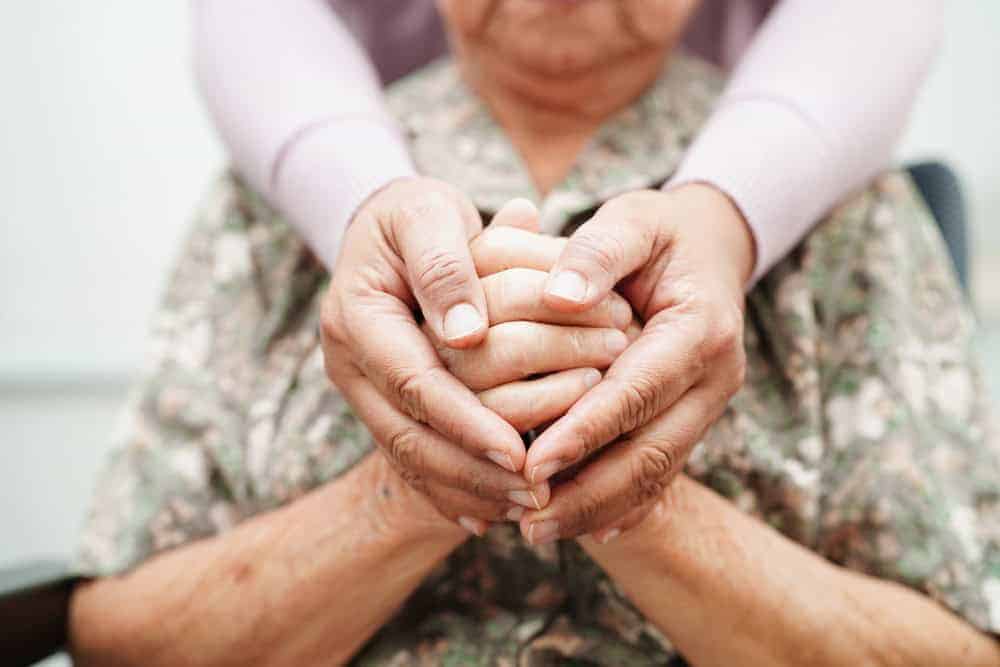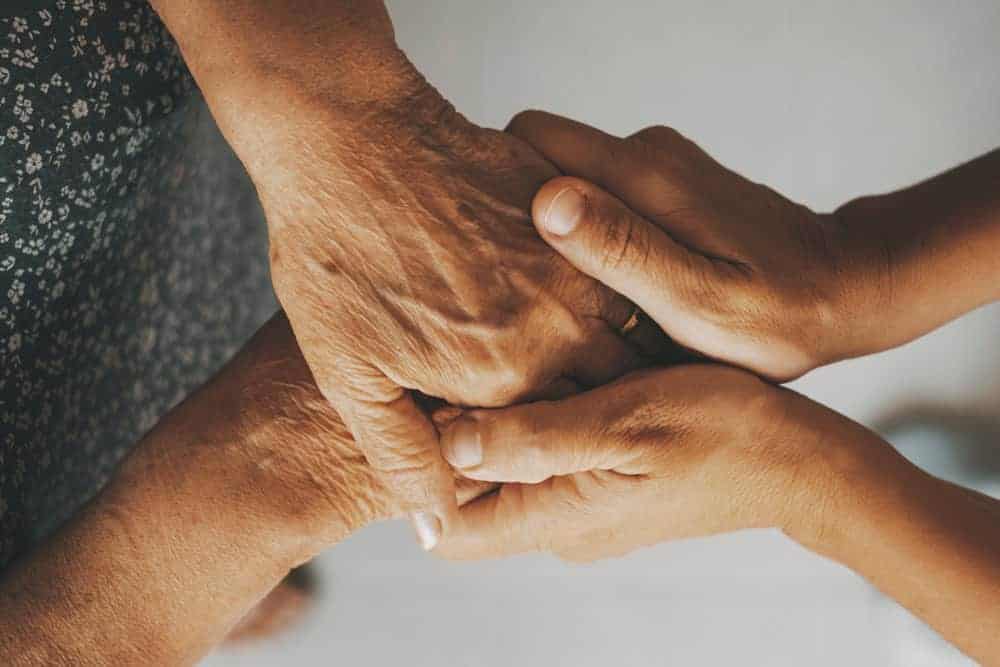
Does your heart sink when the doctor says there’s no cure? Anyone can feel lost about what to do next when someone they love receives a diagnosis of a terminal illness. If you’re in the same boat, it’s normal to feel overwhelmed and helpless. You’re not alone.
Your loved one may have all the recipes for a healthy lifestyle, such as exercise, a balanced diet, and sleep, but some diseases are encoded in the DNA. Negative health news brings up fear, sadness, and anger. But amidst the heartache, knowing how to provide the best care for your loved one can bring them a sliver of comfort during an incredibly difficult time.
Understanding what a terminal disease means, how it changes their care, and what options are available can help you, a family caregiver, be the support they need.
Understanding Terminal Disease
Let’s unpack those phrases you often hear — terminal disease, terminal condition, and terminal patient. While they all seem to define a person with a serious illness like cancer, there are slight differences in their meanings.
- Terminal disease: It refers to a specific medical condition that unfortunately has no known cure. Examples include some forms of terminal cancer, advanced heart failure, or neurological diseases like Amyotrophic lateral sclerosis (ALS).
- Terminal condition: It’s a broader term describing a state of health where death is the likely outcome, even if there’s no specific single disease to blame. It can happen in extreme frailty associated with aging, or after a severe injury or accident.
- Terminal patient: It simply describes an individual diagnosed with either a terminal disease or a terminal condition.
The hard truth is when a cure isn’t possible, the goals of medical care naturally change. For most terminally ill patients, the focus becomes fully centered on managing pain and any other troubling symptoms, maximizing comfort physically, mentally, and emotionally, and honoring your loved one’s wishes and values as their life’s journey draws to a close.
Palliative Care and Hospice

Think of palliative care as an extra layer of support — one centered entirely on making your loved one as comfortable as possible while managing the consequences of their illness. It’s not just for end-of-life needs. It can be extremely helpful at any stage after a serious or terminal diagnosis.
The palliative care teams include doctors or nurses, specialists who handle pain and symptoms, counselors who provide emotional support, and social workers who ensure all the practical aspects of care are taken care of. They’re an extended, compassionate team working alongside an individual’s main healthcare providers.
Hospice care becomes an option for those whose life expectancy has been shortened to months, rather than years. With it kicking in, the goals of care shift to providing expert management of pain and symptoms, along with emotional and spiritual support for both the patient and their family.
While many people choose to receive hospice care at home, it can also be offered in nursing facilities or dedicated hospice centers. It’s important to know that choosing hospice doesn’t mean giving up hope — it’s providing the best possible quality of life for the time that remains.
Palliative vs. hospice differences
- Can start at any point after a serious or terminal diagnosis
- Focuses on pain and symptom relief and emotional and spiritual support
- Is given alongside ongoing curative treatments
- Can be received at home, in the hospital, or an outpatient setting
- Begins when life expectancy has a prognosis of six months or less
- Provides a higher level of pain and symptom management
- Offers emotional support for the patient and their loved ones
- Can be received at home, in a nursing facility, or in a dedicated hospice center
Understanding the difference between these two ensures your dear one has access to care and support that best fits their needs.
Quality of Life and Care at the End

A life-limiting illness diagnosis changes things, but it doesn’t eliminate all of life’s joy and meaning. There’s room for precious moments, connection, safety, and comfort. This is where the focus on quality of life becomes crucial.
So, what does a better quality of life look like for those with a terminal diagnosis and the family they’re leaving behind? Here are some key aspects.
Pain and symptom management
Nobody should have to endure unnecessary suffering. Medications, sometimes in combination with gentle therapies like massage or heat therapy, can make a big difference in keeping pain at bay. Doctors and palliative care specialists are experts in managing shortness of breath, digestive troubles, or all physical discomforts an illness might bring.
Emotional and spiritual care
You and other family members can experience anticipatory grief if someone close is diagnosed with a serious illness. You may feel anxiety, depression, denial, extreme sorrow, and anger. Counselors, social workers, and chaplains are all part of the care team providing support. They offer a safe space to talk about fears, hopes, or the need for spiritual guidance for both the patient and their families.
Making space for joy
Difficult days can capture moments of lightness and simple joy. Mundane things like preparing their favorite meal — even if they can only manage a few bites — playing a song they love, sharing treasured stories, looking at old photos, or offering a gentle hand to hold can all become special memories.
Honoring their wishes
Talking about your loved one’s wishes when they can still participate in making these decisions is important. For instance, they may want their body to be cremated and not buried. It ensures you know what they want and can advocate on their behalf, especially crucial in scenarios involving terminal care.
Here are just a few more examples of when care makes a big difference.
- Keeping them comfortable: A caregiver can help change their bed position often to reduce soreness, adjust special pillows and cushions for better body support, and keep everything dry and clean.
- Addressing practical matters: Are their affairs in order? Do they need help sorting out their finances or insurance paperwork? A social worker can be invaluable here.
- Personal care: Activities of daily living, such as bathing or dressing, can become physically taxing. Caregivers offer help in a gentle, respectful way to preserve your loved one’s dignity.
End-Of-Life Considerations

Those conversations about what happens at the end are almost impossible to have. Many patients deny touching the subject of passing away. But here’s why it’s so important — it’s an act of love for both sides.
Patients can spare their family members from making difficult decisions that will leave them stressed, guilty and wondering whether they did the right or wrong thing. For family members, talking about end-of-life ensures they can act on their loved one’s wishes with respect.
A key term you’ll often hear is advance care planning. What is it? It’s the process of having conversations about things like resuscitation — sometimes shortened to DNR — whether or not your loved one would want to be put on a ventilator if they can’t breathe on their own, or their wishes about being in a hospital versus staying at home.
A doctor, social worker, or specially trained facilitator can guide these discussions, and they often happen over several visits, not just crammed into one stressful appointment.
Advance care plans go beyond medical decisions. Maybe your loved one has strong feelings about their funeral arrangements, where they want to spend their final days, and leaving messages for their family. These are all valid end-of-life considerations, and they’re vital to making space for a loved one’s voice to be heard.
Let’s Talk About the Caregivers, Too
In all honesty, caring for someone with a terminal illness is physically, emotionally, and mentally draining. The focus is always on the patient and caregivers’ well-being is placed on the back burner.
Self-care matters if you’re a primary family caregiver because burnout is prevalent. You can’t give from an empty cup. A whopping 67% of unpaid caregivers experience a mental or behavioral symptom, a hallmark of caregiver stress and burnout.
Ask for help. Friends, family members, neighbors, volunteers — most people are willing to help if you ask. Whether it’s only a few hours off to recharge or help with practical chores, every minute of rest counts to sidestep burnout.
Where can you get help?
- Support groups: Connecting with others facing similar challenges can be a lifesaver. Online and offline support groups give you an avenue to share your experiences, solicit empathy and compassion from understanding people without needing explanation, and sometimes share a laugh amidst the tears.
- Respite care: Whether it’s a few hours a week or an occasional overnight, respite care is an opportunity to detach from your care responsibilities before they eat away at your mental health. In-home services or short-term hospice stays are all options to explore.
- Mental health professionals: Attend therapy or counseling sessions when necessary. Sometimes, all you need is a listener and these professionals are exceptional at it. Taking care of yourself is essential so you can keep caring for your loved one.
You’re not alone in this difficult journey. All you need is to reach out for help.
Improving End-of-Life Care

The good news is people have changed the way they approach end-of-life care. Now, more and more attention is being placed on compassion, quality of life, and supporting families just as much as patients.
Here’s what that looks like in action:
1. More focus on palliative care
There are efforts underway to increase the availability of palliative care specialists and to train more doctors and nurses in these vital skills to provide the best possible care. It helps seamless coordination of care across all settings.
2. Expanding hospice programs
Not everybody is familiar with hospice and what it can offer. Education and increasing the accessibility of hospice programs to a wider audience help bring the incredible benefits of this care to more people who need it.
3. Increasing access to caregiving resources
Care providers and organizations are creating better support networks for caregivers like you. Online resources, caregiver hotlines, and free training and seminars help connect people with local services offering anything from counseling to support with care logistics.
How can you access these valuable caregiver resources? A great starting point is to talk to your primary doctor or a hospital social worker. They can connect you with the following:
- Local palliative care programs: These may be offered through hospitals, dedicated clinics, or even as in-home services.
- Hospice providers: Many agencies offer a range of hospice services. Having information early on empowers you to make a choice that feels right, should the time for hospice care come.
- National organizations: Groups like the National Hospice and Palliative Care Organization or the Center to Advance Palliative Care have a wealth of information you can filter based on your location.
Ethical Considerations
Aside from the sadness and practical decisions surrounding a terminal illness, deeply personal ethical questions can also come up. Know there are no easy answers here, and what’s right for one family might not feel right for another. It’s these situations where open communication and open-mindedness in seeking support are crucial.
Physician-assisted suicide
It’s a complex and often an emotionally charged issue. When faced with unremitting pain and terminal disease, some people strongly feel that individuals should have the right to choose when and how to end their life. Others hold equally strong religious or moral beliefs against it. Laws around this issue vary between states and countries. Open conversations with your loved one about their feelings on this sensitive topic are incredibly important.
Understanding the dying process
Often, fear of the unknown fuels difficult decisions towards the very end of life. Educating yourself about the natural stages of dying can provide some comfort and help you focus on what matters most, which is providing a calm, loving, and supportive presence.
Signs death is approaching may include changes in breathing patterns, decreased appetite and thirst, and increasing listlessness. Dying is not always actively painful, and medications are always available to manage any discomfort.
Where to Seek Guidance

You must be wondering, “Who can I ask for help?” Here are some people you can reach out to:
The healthcare team
Doctors, nurses, and hospice care specialists have experience navigating these difficult waters. They can offer information and resources to help you and your loved one explore complex issues like physician-assisted suicide from a medical and legal standpoint.
Spiritual counselors
If faith is important to you or your loved one, talking with a priest, chaplain, rabbi, or another spiritual leader can provide perspective and comfort and help you explore your beliefs around difficult end-of-life choices.
Trusted friends and family
Sometimes, the simple act of talking through your thoughts and feelings with those who know and love you best can help you understand your own emotions.
Remember, this road is never a journey to walk alone. Leaning on sources of wisdom, compassion, and support can make all the difference when navigating tough ethical dilemmas about the end of life.
Facing the End with Compassion and Support
Facing a terminal diagnosis is one of life’s most heart-wrenching experiences. It will put you through a rollercoaster ride of emotions, combining sadness, fear, and anger. These are valid.
During rough patches, remember you can still find moments of love and connection. It’s an opportunity to shift your attention to keeping your loved one as comfortable as possible, honoring their wishes, and finding ways to make the most of the time you have left together.
Amy’s Eden Senior Care has helped hundreds of families navigate end-of-life and grief from a less negative perspective. Learning about palliative care and hospice, engaging your loved one in end-of-life decisions while they still can, and leaning on the care team for support can make this incredibly challenging journey feel a little less overwhelming and taxing.
Know that you are not alone in this. If you or someone you love is facing a terminal illness, please reach out for help and leverage the resources you have in your hands. Caring for a terminally ill loved one takes an enormous toll. Turn to support groups and prioritize your well-being, too. If you need hospice support, we have dependable and trained caregivers ready to walk you through this journey and make it more meaningful. Send us an email to get specialized care.




